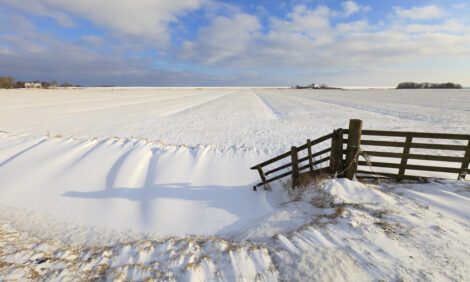



Considerations for Maintaining Condition in our Breeding Bulls during Winter
For bulls coming out of the breeding season, body weight loss may have occurred, and we need to make sure that we get bulls back in condition before the next season.Also, with the weather starting to change, starting to think about how we are going to manage our breeding bulls through the winter to prepare them for the next breeding season will be important. This will be a good time to evaluate body condition and ensure that bulls have adequate protection from harsh weather. We can’t forget about our bull battery over the winter; therefore, let’s go over a few considerations we can think about prior to the next breeding season.
Nutrition
Bulls will often lose anywhere from 100 to 400 pounds during the breeding season. Therefore, monitoring body condition during and after the breeding season will help you know where your bulls are at and how to prepare for weight gain in the off season. Furthermore, once bulls come out of the breeding season, proper nutrition and development still exists after the breeding season. This is especially important for our young bulls that are still growing. For yearling bulls, it will be critical to gain back weight lost during the breeding season and ensure that they continue to gain weight prior to their next breeding season.
Similar to maintaining body condition score (BCS) of the cowherd, bulls should be in an adequate BCS of 5 to 6 as we move into and through winter, which allows for greater BCS and potentially semen quality in the subsequent breeding season. Research has shown that bulls in a BCS of 5 to 6 have better semen quality than those in a 4 or 7. Much like cows, bull body condition needs to be evaluated as fat cover over the front ribs, brisket, and tail head, also making sure to take into account gut fill (EC 281 Body Condition Scoring Beef Cows).
A good vitamin and mineral program is also key for successful animal growth and breeding performance. Some important minerals to consider include, selenium (Se), which plays a key role in spermatogenesis, as well as zinc (Zn), which also plays a role in male fertility, and is critical for sperm cell plasma membrane integrity. In addition, iodine (I) can be added to alleviate any foot rot issues. As you develop rations, or need help from your local extension personnel, including a quality vitamin and mineral program will be important to consider.
Cold Weather Management
With cold weather approaching, ensuring that our bulls have appropriate housing/shelter, bedding, and feed to progress through the winter will be key for future success in the spring. Bulls need appropriate housing to provide protection during severe cold weather, which can lead to fertility problems.
Tissue damage due to frostbite will appear as a scab, discoloration, and/or sloughing of the lower portion of the scrotum. Scrotal frostbite will hinder the bull’s ability to raise or lower the testicles for proper thermoregulation, which ultimately will affect sperm production and result in reduced fertility. Frostbite can be prevented by providing heavy bedding (i.e. straw), a shelter, or windbreak for bulls to get out of the weather. Bedding is important to help mitigate the cold by providing insulation from the frozen ground or snow and keeps cattle clean. Storms with bitter cold temperatures and wind are an obvious time of weather stress. Perhaps less obvious as a cause of weather stress are the moderately cold, windy storms with rain, ice or wet snow that lead to wet hair coats on bulls. Wet hair, like wet clothing, cannot insulate effectively. Providing protection from wind and cold temperatures can help bulls maintain body condition rather than using provided nutrition to maintain body temperatures.
Preparing for Next Breeding Season
Following winter, it will be important to make sure we think about scheduling a breeding soundness exam (BSE) at least 60 days prior to the start of the breeding season. If there has been an insult (i.e., frostbite) occurring between the end of last year’s breeding season and the start of the next, it will take at least 60 days to recover and make new sperm. The 60-day benchmark gives bulls time to recover and recheck (usually 2 to 4 weeks later) will guarantee he won’t be impacting the new breeding season, or gives you time to find another bull. Additional information on bull fertility can be found in a recent article, “Managing Bull Fertility Prior to the Breeding Season”.
Final Thoughts
Because weather insults and injuries can all impact a bull’s ability to breed cows, planning to schedule a breeding soundness exam before each breeding season is important. Providing protection and adequate bedding for bulls during cold weather will ensure scrotums are protected and help maintain body condition over the winter. Maintaining weight or gaining the weight back that bulls lost over the breeding season will be important to manage during the winter.



